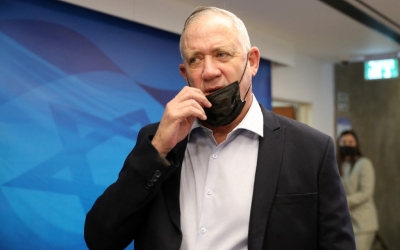Israeli press review: After Afghanistan, Iraq could collapse fast, warns former spy chief

Former Mossad chief fears US Iraq withdrawal
Yossi Cohen, former chief of the Mossad intelligence service, has warned that Tel Aviv should fear a scenario of US withdrawal from Iraq as it would lead to Iran and its proxies dominating the Middle East.
Cohen, whose tenure as the head of Israel's external intelligence ended in June, wrote an op-ed in Yedioth Ahronoth reflecting on the consequences of the US withdrawal from Afghanistan last month and America's foreign policy focus on its archrivals China and Russia.
'A hasty and ill-considered [US] withdrawal could lead to a complete collapse of Iraq into various sects'
- Yossi Cohen, former chief of the Mossad
He added that a US withdrawal of soldiers in Iraq would ignite a sectarian conflict, pushing Iran to increase its military presence.
"A hasty and ill-considered [US] withdrawal could lead to a complete collapse of Iraq into various sects," he wrote, arguing that the "sad result may be an increase in the Iranian military, extremist, political and terrorist presence inside [Iraq]."
Stay informed with MEE's newsletters
Sign up to get the latest alerts, insights and analysis, starting with Turkey Unpacked
In July, President Joe Biden said that his administration planned to withdraw US soldiers from Iraq and conclude its combat mission by the end of 2021. The remarks came during a White House visit by Iraqi Prime Minister Mustafa al-Kadhimi, who has had to deal with Iran-backed militias and the geopolitical interests of Saudi Arabia and Turkey.
Currently, almost 2,500 US soldiers are offering help to Iraqi forces, but do not participate in combat missions.
Cohen wrote that Israel should be prepared for a swift collapse of whole areas in the north of the Middle East under Iran's influence and domination following a withdrawal of US forces from Iraq, likening the scenario to the Taliban's lightning capture of Kabul in a matter of days in August.
"Iran has not for a moment stopped making efforts to consolidate its military position in [the Middle East]," Cohen wrote.
He added that Iran had a "tangible and worrisome" base in Iraq as well as in Syria and Lebanon.
"[Iran] depends on two legs: the Popular Mobilisation Forces, which seek to prevent secretly and publicly from uniting Iraq, and next to it, the big presence of [Iran's] Revolutionary Guards and al-Quds Brigade," Cohen wrote.
"Israel stands at a fateful crossroads," he warned, pointing to the ongoing US and European negotiations with Iran in which economic sanctions would be lifted in return for strict international monitoring and limiting Iran's development of its nuclear programme.
Cohen concluded that Israel needs to answer some crucial questions regarding Iran's military and nuclear activities in the Middle East while keeping active diplomatic channels with its allies in Europe, the US, and Russia.
"Israel and its leaders must form a strategy and set clear goals for a new policy. Our demands must be placed in a stable Middle East, where Iran's ability to position itself across the region is neutralised and does not allow it to become a nuclear threshold state," Cohen wrote.
Bahrain's first ambassador to Israel
Khaled Yousif al-Jalahma, Bahrain's first ambassador to Israel, arrived on Tuesday in Tel Aviv to take up his post, almost a year after Bahrain, the United Arab Emirates and Israel signed normalisation deals in Washington, Channel 13 reported.
Jalahma tweeted before his arrival to Tel Aviv, saying that "the opportunity to fulfil His Majesty King Hamad bin Isa Al Khalifa's vision of peaceful coexistence with all nations is a privilege that I will hold in high regard."
Jalahma, who arrived in Israel with his wife, was appointed in March as an ambassador.
Israel's foreign ministry released a statement saying that the opening of a Bahraini embassy in Tel Aviv "marked an important step in developing the bilateral relations between the two countries and their peoples."
In June, Israel's foreign minister, Yair Lapid, inaugurated his country's embassy in Abu Dhabi, followed in July by the UAE opening its mission in Tel Aviv's new stock exchange building.
First anniversary of 'Abraham Accords'
On the first anniversary of signing the US-led normalisation deal between Bahrain, the UAE and Israel in September 2020, also known as the Abraham Accords, Israel's KAN broadcaster is airing a programme to discuss the "secrets" of the foreign policy that led the agreements.
Alon Ushpiz, foreign ministry director-general, admitted to KAN that "it has been very difficult to keep Israeli diplomacy completely in the dark for two decades," with countries such as the UAE.
Benny Gantz, Israel's minister of defence at the time of signing the agreement, told KAN that he was "pleased" about it.
He added that he made sure that Israel's security was maintained at all costs with a conversation with former Prime Minister Benjamin Netanyahu.
"But I welcome [the agreements]. And I will do everything for it to succeed," Gantz told Netanyahu, according to KAN.
The programme interviews other Israeli officials, including then-foreign minister Gabi Ashkenazi, who along with Gantz, Netanyahu kept in the dark regarding the deal with Bahrain and UAE for fear of leaking details to the media.
Ashkenazi did not sign the so-called Abraham Accords, but Netanyahu did during a public ceremony in the White House with former US President Donald Trump.
"I thought to torpedo this status," Ashkenazi said. "I don't know if the public knows, but in law, the only person who can sign an agreement with another country is the foreign minister," not the prime minister, he added.
KAN reported that parts of the Abraham Accords remain secret, including some deals with the military.
* Israeli press review is a digest of reports that are not independently verified as accurate by Middle East Eye.
This article is available in French on Middle East Eye French edition.
Middle East Eye delivers independent and unrivalled coverage and analysis of the Middle East, North Africa and beyond. To learn more about republishing this content and the associated fees, please fill out this form. More about MEE can be found here.






